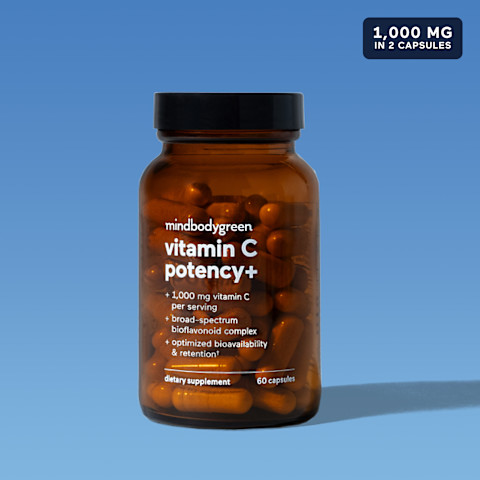3 Must-Do Steps If You Want To Avoid Dark Spots & Fine Lines (But Still Enjoy Sunshine)

By now, I think most beauty obsessives know the myriad aesthetic side effects that come from unprotected sun exposure. But for those who need a recap, UV rays account for up to 80% of visible signs of aging1, which include fine lines, dark spots, texture changes, and sagging. (Not to mention, UV damage can lead to much worse—i.e. melanoma.)
This doesn’t mean you have to avoid sun and time outdoors altogether. To suggest that would be not only unrealistic, but would undermine the mental health benefits of sunshine. But if skin health and, ahem, appearance are important to you—it does mean you need to take the appropriate precautions.
With just a few extra steps, you could save yourself from dealing with pesky, hard-to-fade sun spots and deeper, more permanent fine lines down the line.
It can also save you from having to use more intensive interventions and potent products in the future. So why not just do the extra work now?
Here, how to keep your skin healthy and still enjoy that precious sunshine.
Sunscreen
This can’t come as a surprise to any regular readers of mine, but the most important step to care for your skin is (say it with me): Sunscreen! It is the single greatest “anti-aging” ingredient on the market because it stops the damage from happening in the first place.
Unfortunately, usage isn’t as widespread as many beauty experts would like: Surveys indicate that only 11% of Americans do so. And about half of Americans report they never wear sunscreen.
If you count yourself in that “rarely-to-never apply” camp, I strongly encourage you to check out the crop of new sunscreens. There are formulas that are everything you want a sunscreen to be. They feel great when you apply, don’t pill under makeup, don’t irritate sensitive skin, and work for a wide range of skin tones and types.
Antioxidants
I’m constantly reminded of this golden advice given to me from board-certified dermatologist Rachel Nazarian, M.D., of Schweiger Dermatology Group about antioxidants: "People often ask how many antioxidants you should be using regularly; the answer is: the more the better. The more you can help neutralize unstable molecules caused by free radical formation, the longer you can salvage the health of your cells and skin. There's really no limit to how much you can protect and repair your body!"
Antioxidants help stop the cascade of free radical damage triggered by UV radiation. Use them before you go out in the sun, during, and after.
Another huge benefit of the free radical fighters is that there are so many of them to pick from. While antioxidants as a category target free radicals, the individual antioxidants themselves can offer more specific benefits tailored to your needs.
A rundown of a few of the more popular ones:
- CoQ10: This lipid-soluble antioxidant helps with cellular energy production2, which means it can help your skin cells remain youthful. It also protects against lipid peroxidation3, which is just a fancy way of saying it ensures your skin cell membranes stay strong.
- Vitamin C: This derm-favorite antioxidant not only brightens, but it can help with collagen production. Vitamin C is a vital part of the collagen synthesis process.
- Niacinamide: This B vitamin supports the skin barrier and can help fade dark spots.
- Resveratrol: This polyphenol is used to reduce inflammation in the skin and support rejuvenation4.
- Astaxanthin: This marine-extract is a carotenoid that is 6,000 times more potent than vitamin C.
Retinol
Retinol is a vitamin A derivative that’s considered to be the “gold standard” of aging ingredients as it’s one of the most studied for its effects on the skin.
The ingredient does a lot when applied topically, including helping deal with sun damage. Retinol combats the effect by inhibiting metalloproteinases5, or collagen-degrading enzymes. Additionally, as it encourages cell turnover, it helps thicken the epidermis and even out hyperpigmentation6. Not only does it protect against collagen loss, but it can help enhance production too by upregulating collagen-producing genes. This effect was observed in a small human study, where retinol treatment stimulated collagen production7 in mature skin, helping decrease the appearance of wrinkling.
For many professionals, it's considered a “must.” However, retinol is notoriously difficult to tolerate—especially if you have sensitive or dry skin. And for these folks, it may end up causing more harm than good. So I tell people to use it if they can, but don’t force yourself if it triggers inflammation.
The takeaway
Here’s the deal: You can either do proper sun care now, or you can treat the effects later. Either way, you’re going to have to deal with it sometime.
7 Sources
- https://www.ncbi.nlm.nih.gov/pmc/articles/PMC3790843/
- https://www.ncbi.nlm.nih.gov/pmc/articles/PMC4737275/
- https://www.ncbi.nlm.nih.gov/pmc/articles/PMC5514578/
- https://pubmed.ncbi.nlm.nih.gov/29737899/
- https://www.ncbi.nlm.nih.gov/pmc/articles/PMC6791161/
- https://www.ncbi.nlm.nih.gov/pubmed/31524348
- https://jamanetwork.com/journals/jamadermatology/fullarticle/412795

